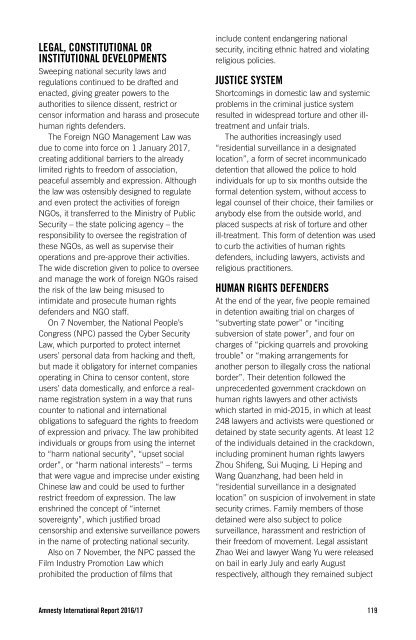AMNESTY INTERNATIONAL REPORT 2016/17
2lEHU9j
2lEHU9j
You also want an ePaper? Increase the reach of your titles
YUMPU automatically turns print PDFs into web optimized ePapers that Google loves.
LEGAL, CONSTITUTIONAL OR<br />
INSTITUTIONAL DEVELOPMENTS<br />
Sweeping national security laws and<br />
regulations continued to be drafted and<br />
enacted, giving greater powers to the<br />
authorities to silence dissent, restrict or<br />
censor information and harass and prosecute<br />
human rights defenders.<br />
The Foreign NGO Management Law was<br />
due to come into force on 1 January 20<strong>17</strong>,<br />
creating additional barriers to the already<br />
limited rights to freedom of association,<br />
peaceful assembly and expression. Although<br />
the law was ostensibly designed to regulate<br />
and even protect the activities of foreign<br />
NGOs, it transferred to the Ministry of Public<br />
Security – the state policing agency – the<br />
responsibility to oversee the registration of<br />
these NGOs, as well as supervise their<br />
operations and pre-approve their activities.<br />
The wide discretion given to police to oversee<br />
and manage the work of foreign NGOs raised<br />
the risk of the law being misused to<br />
intimidate and prosecute human rights<br />
defenders and NGO staff.<br />
On 7 November, the National People’s<br />
Congress (NPC) passed the Cyber Security<br />
Law, which purported to protect internet<br />
users’ personal data from hacking and theft,<br />
but made it obligatory for internet companies<br />
operating in China to censor content, store<br />
users’ data domestically, and enforce a realname<br />
registration system in a way that runs<br />
counter to national and international<br />
obligations to safeguard the rights to freedom<br />
of expression and privacy. The law prohibited<br />
individuals or groups from using the internet<br />
to “harm national security”, “upset social<br />
order”, or “harm national interests” – terms<br />
that were vague and imprecise under existing<br />
Chinese law and could be used to further<br />
restrict freedom of expression. The law<br />
enshrined the concept of “internet<br />
sovereignty”, which justified broad<br />
censorship and extensive surveillance powers<br />
in the name of protecting national security.<br />
Also on 7 November, the NPC passed the<br />
Film Industry Promotion Law which<br />
prohibited the production of films that<br />
include content endangering national<br />
security, inciting ethnic hatred and violating<br />
religious policies.<br />
JUSTICE SYSTEM<br />
Shortcomings in domestic law and systemic<br />
problems in the criminal justice system<br />
resulted in widespread torture and other illtreatment<br />
and unfair trials.<br />
The authorities increasingly used<br />
“residential surveillance in a designated<br />
location”, a form of secret incommunicado<br />
detention that allowed the police to hold<br />
individuals for up to six months outside the<br />
formal detention system, without access to<br />
legal counsel of their choice, their families or<br />
anybody else from the outside world, and<br />
placed suspects at risk of torture and other<br />
ill-treatment. This form of detention was used<br />
to curb the activities of human rights<br />
defenders, including lawyers, activists and<br />
religious practitioners.<br />
HUMAN RIGHTS DEFENDERS<br />
At the end of the year, five people remained<br />
in detention awaiting trial on charges of<br />
“subverting state power” or “inciting<br />
subversion of state power”, and four on<br />
charges of “picking quarrels and provoking<br />
trouble” or “making arrangements for<br />
another person to illegally cross the national<br />
border”. Their detention followed the<br />
unprecedented government crackdown on<br />
human rights lawyers and other activists<br />
which started in mid-2015, in which at least<br />
248 lawyers and activists were questioned or<br />
detained by state security agents. At least 12<br />
of the individuals detained in the crackdown,<br />
including prominent human rights lawyers<br />
Zhou Shifeng, Sui Muqing, Li Heping and<br />
Wang Quanzhang, had been held in<br />
“residential surveillance in a designated<br />
location” on suspicion of involvement in state<br />
security crimes. Family members of those<br />
detained were also subject to police<br />
surveillance, harassment and restriction of<br />
their freedom of movement. Legal assistant<br />
Zhao Wei and lawyer Wang Yu were released<br />
on bail in early July and early August<br />
respectively, although they remained subject<br />
Amnesty International Report <strong>2016</strong>/<strong>17</strong> 119


